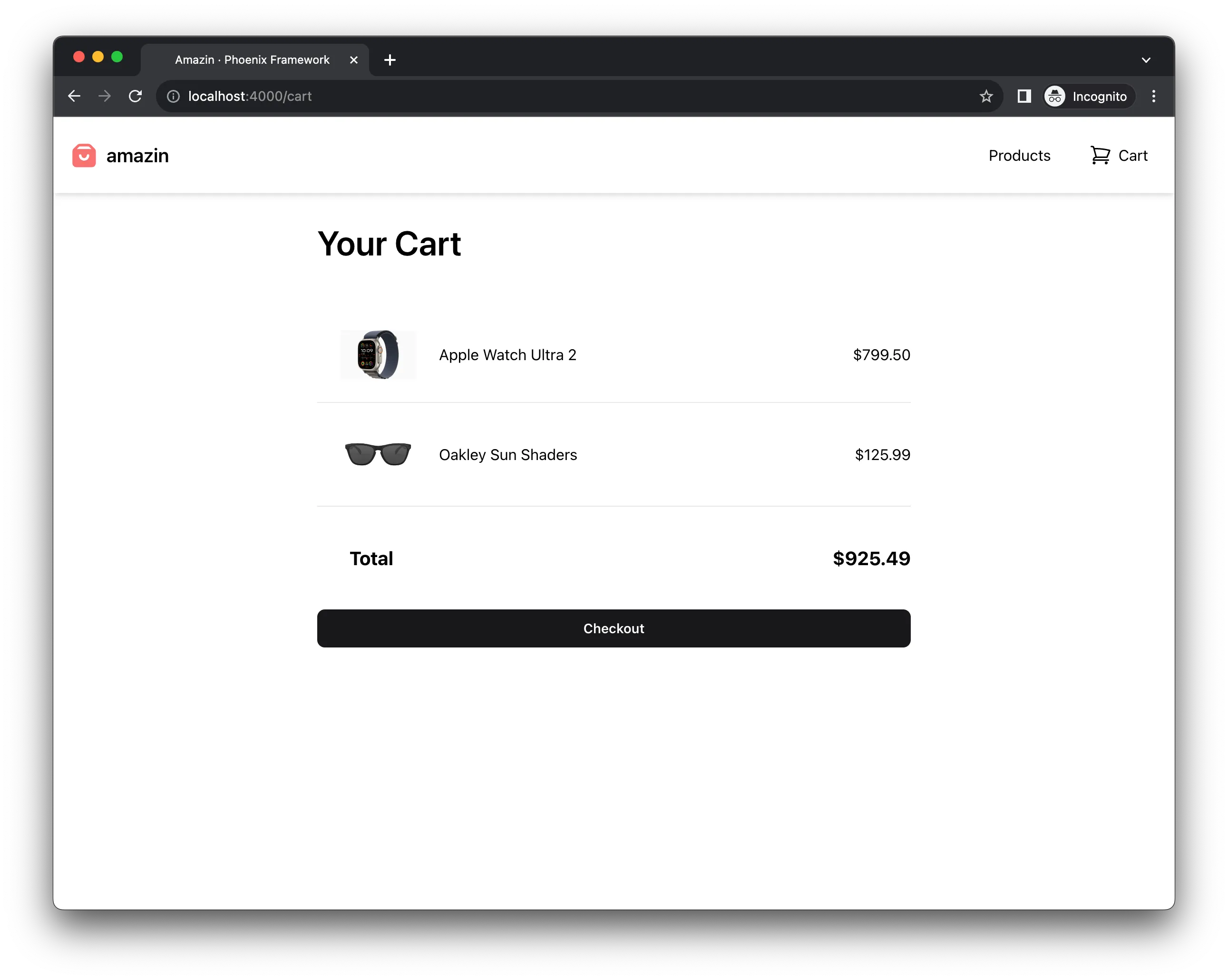Introduction
Earlier we added our HTML for our products page and you may have noticed on our Add to cart button we included
a phx-click="add_to_cart" attribute. This set us up to handle that button click in elixir, and manage a cart full of products!
Add to cart
Using the awesome powers of phoenix generators again, we’re going to create a few schemas for our cart.
We’re going to create a Cart schema that will have many CartItem’s describing one Product.
First create our Cart schema —
mix phx.gen.schema Store.Cart carts status:enum:open:abandoned:completedThen create our CartItem schema -
mix phx.gen.schema Store.CartItem cart_items cart_id:references:carts product_id:references:products quantity:integerAdd a unique constraint to our cart_items migration so we can increment quantity later —
defmodule Amazin.Repo.Migrations.CreateCartItems do
use Ecto.Migration
def change do
create table(:cart_items) do
add :quantity, :integer
add :cart_id, references(:carts, on_delete: :nothing)
add :product_id, references(:products, on_delete: :nothing)
timestamps()
end
create index(:cart_items, [:cart_id])
create index(:cart_items, [:product_id])
+ create unique_index(:cart_items, [:cart_id, :product_id])
end
endRemember to migrate the DB to keep it up-to-date —
mix ecto.migrateWe need to add a query to list our cart items for our cart live view.
Update the CartItem schema to describe it’s association to Product so we can write a simpler query —
defmodule Amazin.Store.CartItem do
use Ecto.Schema
import Ecto.Changeset
+ alias Amazin.Store.Product
schema "cart_items" do
field :quantity, :integer
field :cart_id, :id
- field :product_id, :id
+ belongs_to :product, Product
timestamps()
end
endThen add the needed context functions to the Amazin.Store content —
defmodule Amazin.Store do
# ... Removed for brevity
alias Amazin.Store.Cart
@doc """
Create a cart.
## Examples
iex> create_cart()
{:ok, %Cart{}}
"""
def create_cart do
Repo.insert(%Cart{status: :open})
end
@doc """
Get a cart by id.
## Examples
iex> get_cart(1)
%Cart{}
"""
def get_cart(id) do
Repo.get(Cart, id)
end
alias Amazin.Store.CartItem
@doc """
List products in a cart.
## Examples
iex> list_cart_items(344)
[%CartItem{}, %CartItem{}]
"""
def list_cart_items(cart_id) do
CartItem
|> where([ci], ci.cart_id == ^cart_id)
|> preload(:product)
|> Repo.all()
end
@doc """
Add a product to a cart. Increments quantity on conflict.
## Examples
iex> add_item_to_cart(1, %Product{})
{:ok, %Product{}}
"""
def add_item_to_cart(cart_id, product) do
Repo.insert(%CartItem{cart_id: cart_id, product: product, quantity: 1},
conflict_target: [:cart_id, :product_id],
on_conflict: [inc: [quantity: 1]]
)
end
endWe need to ensure that a valid cart is always available for users. To do this, we’re going to write a custom plug —
defmodule AmazinWeb.Plugs.SessionCart do
@moduledoc """
Plug to ensure an open cart is assigned to the session.
"""
@behaviour Plug
import Plug.Conn
alias Amazin.Store
@impl true
def init(default), do: default
@impl true
def call(conn, _config) do
case get_session(conn, :cart_id) do
nil ->
{:ok, %{id: cart_id}} = Store.create_cart()
put_session(conn, :cart_id, cart_id)
cart_id ->
case Store.get_cart(cart_id) do
%{status: :open} ->
conn
_cart ->
{:ok, %{id: cart_id}} = Store.create_cart()
put_session(conn, :cart_id, cart_id)
end
end
end
endThen in your router, add it to the :browser pipeline —
defmodule AmazinWeb.Router do
use AmazinWeb, :router
pipeline :browser do
plug :accepts, ["html"]
plug :fetch_session
plug :fetch_live_flash
plug :put_root_layout, html: {AmazinWeb.Layouts, :root}
plug :protect_from_forgery
plug :put_secure_browser_headers
+ plug AmazinWeb.Plugs.SessionCart
end
# ... Removed for brevity
endNext let’s wire up our product live view to handle adding items to a cart in the session.
Replace the mount function, add a new handle_info/2 function, and add the handle_event/3 function for adding to cart —
defmodule AmazinWeb.ProductLive.Index do
# ... Removed for brevity
@impl true
def mount(_params, session, socket) do
if connected?(socket), do: Store.subscribe_to_product_events()
socket =
socket
|> assign(:cart_id, session["cart_id"])
|> stream(:products, Store.list_products())
{:ok, socket}
end
# ... Removed for brevity
@impl true
def handle_info(:clear_flash, socket) do
{:noreply, clear_flash(socket)}
end
# ... Removed for brevity
@impl true
def handle_event("add_to_cart", %{"id" => id}, socket) do
product = Store.get_product!(id)
Store.add_item_to_cart(socket.assigns.cart_id, product)
Process.send_after(self(), :clear_flash, 2500)
{:noreply, socket |> put_flash(:info, "Added to cart")}
end
endNote how we pattern match on the name of the phx-click attribute, and we receive a map of any phx-value-* attributes.
On our button, we also added a phx-value-id attribute which is set to each respective product id.
We’re now ready to build our cart UI!
Cart Live View
The cool thing I’ve realized about live-view is even though I don’t have any “live” parts to this cart page, it’s still fine to build as a live-view because the overhead is minimal, and the semantics are awesome.
First thing we need to do is add a few routes pointing to some live-view’s we are going to create —
scope "/", AmazinWeb do
pipe_through :browser
get "/", PageController, :index
live "/products", ProductLive.Index, :index
live "/products/:id", ProductLive.Show, :show
+ live "/cart", CartLive.Show, :index
+ live "/cart/success", CartLive.Success, :index
endNext let’s add a basic live view for the cart —
defmodule AmazinWeb.CartLive.Show do
use AmazinWeb, :live_view
alias Amazin.Store
@impl true
def mount(_params, session, socket) do
cart_items = Store.list_cart_items(session["cart_id"])
total =
cart_items
|> Enum.map(fn ci -> ci.product.amount * ci.quantity end)
|> Enum.sum()
|> Money.new()
socket =
socket
|> assign(:cart_id, session["cart_id"])
|> assign(:total, total)
|> stream(:cart_items, cart_items)
{:ok, socket}
end
@impl true
def handle_params(_params, _url, socket) do
{:noreply, socket}
end
endAnd then the HTML —
<div class="grid grid-cols-1 px-6 max-w-2xl mx-auto" id="cart_items" phx-update="stream">
<h1 class="text-4xl pb-12 font-semibold">Your Cart</h1>
<div
:for={{dom_id, cart_item} <- @streams.cart_items}
id={dom_id}
class="cursor-pointer grid grid-cols-[8rem_1fr_auto] items-center border-b"
phx-click={JS.navigate(~p"/products/#{cart_item.product}")}
>
<img
class="p-6 object-contain"
src={cart_item.product.thumbnail}
title={cart_item.product.name}
alt={cart_item.product.name}
/>
<div>
<%= cart_item.product.name %>
</div>
<div>
<%= Money.new(cart_item.product.amount * cart_item.quantity) %>
</div>
</div>
<div class="grid grid-cols-[5rem_auto] items-center py-10">
<div class="font-bold text-xl text-right">Total</div>
<div class="font-bold text-xl text-right">
<%= @total %>
</div>
</div>
<.button phx-click="checkout">
Checkout
</.button>
</div>To test it out, let’s add some items to our cart from the products page, then click the cart icon and…

Amazing. Now we’re ready for the final strech.
Finished application on github.
